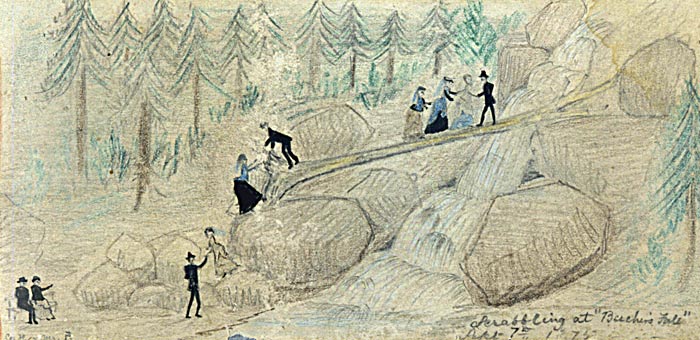
One of twenty-one frames composing a panoramic scroll which records a trip to the White Mountains by eight young men and women from New York in 1875; drawn by an unidentified woman in the group. New Hampshire Historical Society.
Next to the ascent of Mount Washington, . . . you will wish to explore
the attractions of this widely-famed pass in the mountains. The
peculiar grandeur of this vast and awful gorge cannot be described in
words, and the artist transmits the grand outlines but imperfectly. On
either hand, the forbidding line of precipices tower above you in
imposing grandeur, and you halt and turn to admire its savage
ruggedness.
Snow's Handbook of Northern Pleasure Travel,1876
Crawford Notch
The typical tour continues up the Saco River through the narrow mountain pass long called simply the Notch, the Great Notch, or the White Mountain Notch. As tourism brought more outsiders to the area, this pass assumed the name of Crawford Notch after a local family associated for generations with the area’s leading inns.
The power of nature and its impact on man comes into focus no place more clearly than at Crawford Notch. In August 1826, this was the site of a deluge and landslide that killed the entire Samuel Willey family, while sparing the house from which the family had fled. The news of this natural disaster loomed in the American consciousness for decades, and awe and curiosity concerning the incident helped fuel the development of tourism in the White Mountains.
In striking contrast to the threatening aspect of nature within the notch, tourists were then delighted to find, just north of the passageway’s narrowest and darkest portion (known as the Gate of the Notch), a broad, open plateau, at the center of which stood the fashionable Crawford House. The visual and commercial center of the mountain region, the hotel boasted all the amenities of a summer resort including an artist-in-residence.
